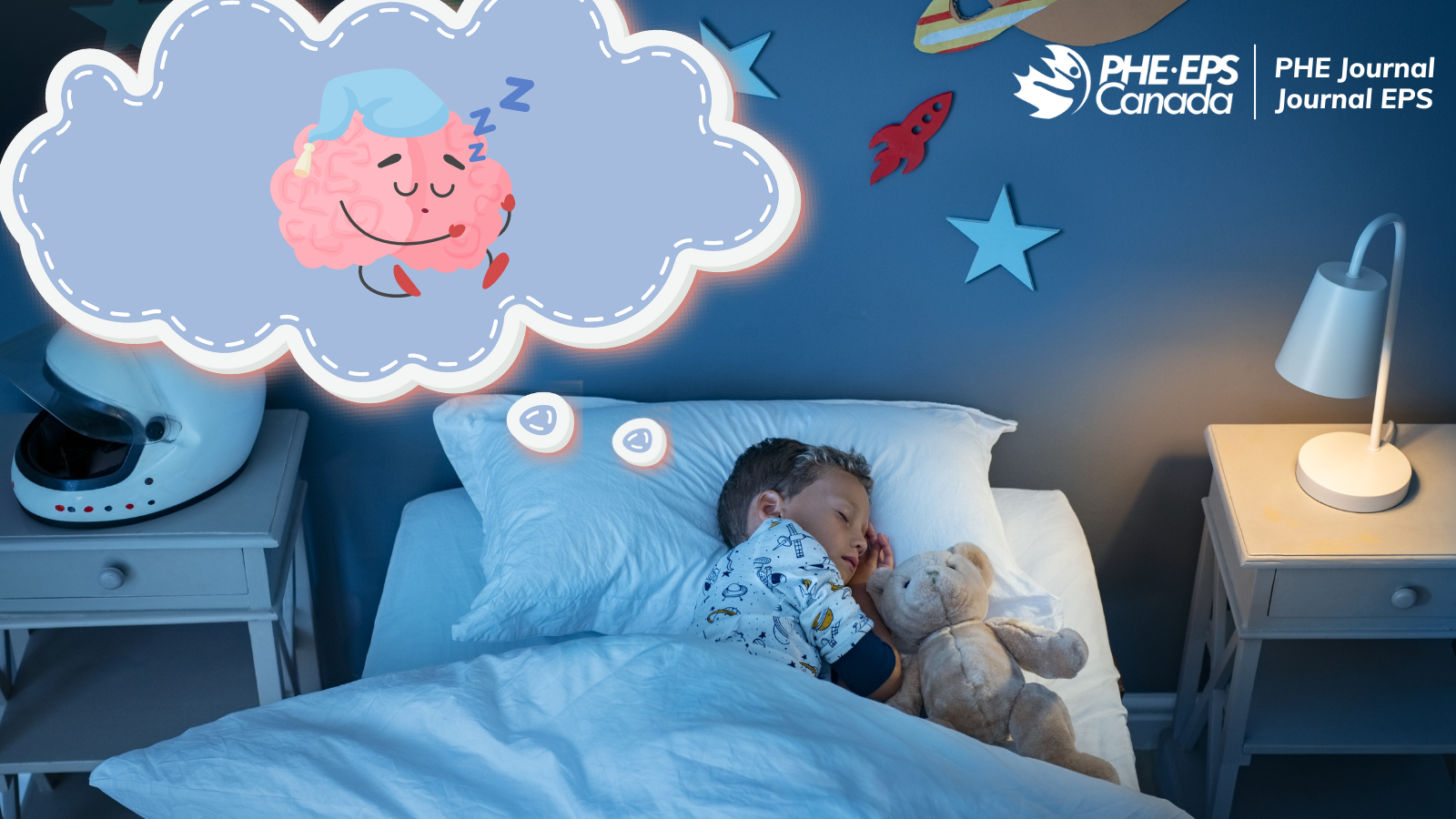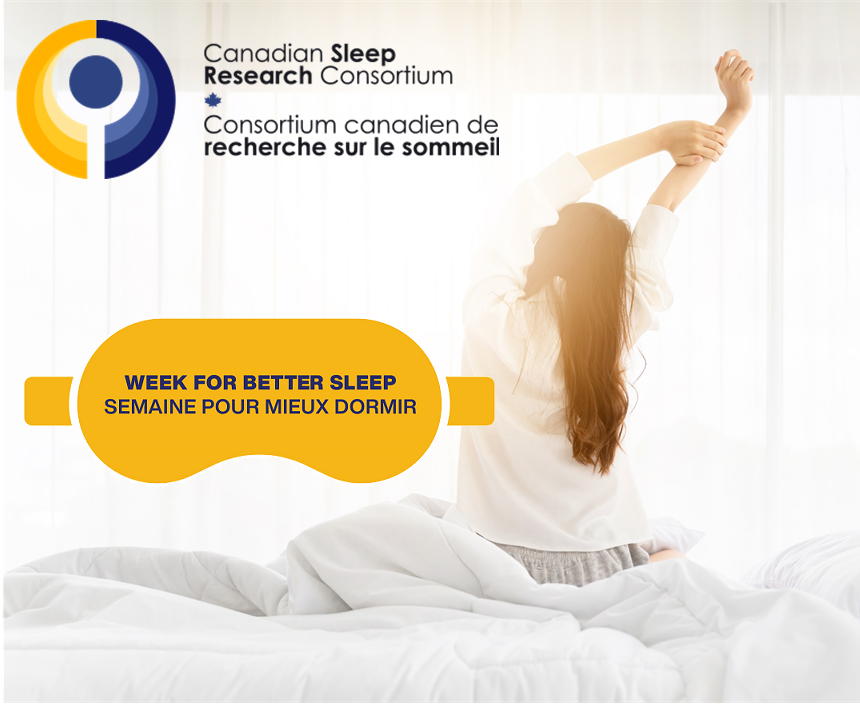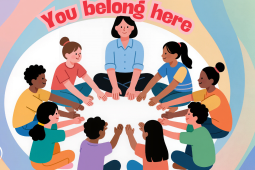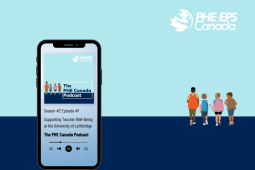How Teachers and Students Can Thrive with Healthier Sleep Habits

"Sleep is vital for good health, just like nutrition and exercise. Yet, we can face challenges with both the quality and quantity of our sleep. The good news is that there are things most of us can do to improve our sleep and support our overall well-being." - Dr. Rébecca Robillard
Sleep is a vital aspect of one’s wholistic well-being and quality of life; but it’s also something that many of us struggle and face challenges with. Many factors affect the quantity and quality of our sleep, and it could feel daunting trying to develop healthier sleep habits. However, when the importance of sleep takes a backseat, it can have drastic effects on one’s physical and mental health, academic achievement, work productivity, and social-emotional regulation (Williamson et al., 2020).

To shed light on how teachers, students, and their families can work together to build sleep habits that prepare their mind and body for better sleep, the Canadian Sleep Research Consortium is launching its first-ever “Week for Better Sleep”. Starting on March 15th, also known as “World Sleep Day”, the “Week for Better Sleep” initiative kicks off as it aims to raise awareness about the crucial role of sleep for overall well-being and how to develop healthier sleep habits.
PHE Canada had the pleasure of interviewing Dr. Rébecca Robillard, Co-Chair for Canadian Sleep Research Consortium; Associate Professor, School of Psychology at the University of Ottawa; and Scientist, University of Ottawa Institute of Mental Health Research at the Royal, to learn more about why sleep is so important, how teachers and students can develop healthier sleep habits, and how our PHE Community can get involved with “Week for Better Sleep”.
Q: Dr. Rébecca Robillard, tell us a bit about your research and the Canadian Sleep Research Consortium?
The Canadian Sleep Research Consortium is a national hub of sleep scientists and clinicians advancing research and interventions to optimize sleep health throughout the lifespan. We create educational opportunities for people to better advocate for sleep health: from healthcare providers to teachers and decision makers. The research of the Canadian Sleep Research Consortium is centered on 3 main areas:
We research these 3 main areas by running different projects, such as:
- Mapping how frequent insomnia is in Canada and how it impacts people’s lives. Insomnia can seem very different from one person to the other so we are taking a deep dive in search for different biologic profiles of insomnia that could call for different treatments.
- Promoting healthy sleep habits in different age groups, from infants to seniors.
- Assessing how factors like ethnicity/race, gender, sexual orientation, family income, and geographic location influence people’s sleep to increase our understanding of inequities in sleep health and access to sleep treatments. We also work with Indigenous communities to learn more about their perspectives on sleep and co-create adapted sleep interventions.
We also aim to bring science outside of the lab and into people’s bedrooms. We work to promote sleep health, both at the individual and societal levels. For example, we share evidence-based strategies and tools to protect or improve our sleep. We are keen to increase awareness about the developmental changes that pushes the body clock later during adolescence. This call for later school start time to respect our teens’ natural sleep-wake cycles.
Q: What drew you to this type of research?
I have always been intrigued by the connection between matter and mind; how electrical impulses and biochemical shifts in our brain shape our experiences (how we think, feel, and perceive the world around us). These experiences change across different states of consciousness that are tied to changes in our brain activity. This is exactly what happens during sleep. Our brain does not just shut down, it enters a different world, both from a biological perspective and an experiential perspective. All in all, what first drew me to sleep research was my own curiosity and fascination.
However, as I progressed through my training as a neuropsychologist and a sleep scientist, I came to understand how important sleep is to so many aspects of mental and physical health. It became apparent to me that, by investing in protecting sleep, we can prevent a whole range of diseases or attenuate the consequences of these diseases. It became clear to me that sleep is a modifiable factor that we can strategically target to protect and improve health.
Q: Why is sleep so important and how can poor sleep habits impact teachers?
Teaching is a vocation. It is a highly demanding profession guiding children and adolescents to learn, acquiring the knowledge and skills that prepare them for the future. Teaching requires concentration and being attentive, flexible, patient and compassionate to the diverse needs of their students. It mobilizes substantial resources for thinking skills, emotional regulation, and, often, physical fitness. Sleep contributes to the restoration of all of these functions.
Sleep is important because it helps us stay focused, think creatively, resolve issues, and deal with stressors while maintaining emotional balance. To put this very graphically, the more time we spend awake and active, the more our brain accumulates neurotoxins. During sleep, the space between neurons expands, this increases the flow of the liquid in our brain, which flushes the toxins away. Strikingly, 60% of the brain cleaning happens during sleep! We also know that during sleep, especially during deep sleep, we increase the production of growth hormones, which helps repair the wear and tear that our body endured during the day. Furthermore, sleep actively boosts the immune system. This strengthens the body’s natural defense against viruses that may circulate in the classroom!
All in all, sleep is a strong ally for maintaining top teaching performance, coping with daily challenges that arise in and out of class, and maintaining good mental and physical health.
Q: For teachers who are struggling with the quality and quantity of their sleep, what tips or recommendations would you give them?
We want our teachers well rested, sharp, and happy, and this starts with good sleep. Habits for healthy sleep do not just happen at night. Sleep tips range from what you do during the day, in the evening as you prepare for bed, and when in bed. Below are two important tips to help teachers build healthier sleep habits:

Avoid exercise in the hour preceding bedtime. Increasing your heart rate through physical exercise is excellent for sleep; but, if it happens too close to bedtime it can make it harder to fall asleep.
Maintain a stable schedule for bedtime and wake-up time. Try setting an alarm, not just in the morning, but also 1 hour before bedtime to cue us that it is time to start winding down and getting ready for sleep.
Sleep tips can be very helpful, but for some people, this may not be sufficient. Unfortunately, recent Canadian research shows that up to 61% of teachers have insomnia symptoms. The recommended first line of treatment for insomnia is cognitive behavioral therapy for insomnia (CBT-I). This treatment uses progressive sleep manipulations to restore sleep quality, while providing guidance on restructuring behaviors and thoughts about sleep. You can learn more about CBT-I and how to access it here: https://www.researchsleep.ca/insomnia.
Q: If teachers want to learn more healthy sleep habit tips, what resources do you recommend?
The Canadian Sleep Research Consortium is launching the Week for Better Sleep which is a chance to try out some sleep tips for one week of your life and see what difference it makes for you! This is an opportunity for individuals, families, and teams to learn more about sleep and try evidence-based sleep tips tailored to different age groups. You can register to receive daily tips for better sleep and share your feedback to contribute valuable insights to sleep research.
You can also register your own children and use this opportunity to have family discussions about sleep. We invite people of all ages to participate, so spread the word! People can sign up at: www.ResearchSleep.ca.
Q: What are some challenges that students may face with their sleep that you would want teachers to know?
Sleep changes in many ways across different phases of development. This is one of the many things growing children have to adapt to!
- Some of the younger ones may still be transitioning out from the need for naps as they enter kindergarten or even year 1.
- School age children still need 9-12 hours of sleep.
- Teens undergo a clear shift in their body clock. This pushes their sleep hormones later, which delays the time at which their brain and body are ready to fall asleep and wake up.
- While many teens have to wake up early to get to school in the morning, they may be unable to go to sleep early enough to get the 8-10 hours of sleep they need. As a result, many teens get sleep deprived and build a sleep debt night after night. Of note, children and teens with neurologic or developmental disorders are 5 to 8 times more at risk of sleep issues!
Q: How could poor quality and quantity of sleep impact students' learning?
If students don’t get enough sleep, it can impact them in many ways:
- Sleep literally acts as the cement that solidifies the building bricks of what we learn during the day. While we sleep, the brain reactivates and reorganizes the specific networks that underlie the new memory traces we formed while awake. This strengthens our memory. Hence, sleep is a foundational part of the learning process.
- If children and teenagers don’t meet their sleep needs, they become at risk of poor mental and physical health. For instance, we noted higher rates of obesity, diabetes, and infections in youth with poor sleep. Poor sleep also often leads to arriving late at school and missing more school days. Insufficient sleep is linked to being drowsy in class, inattentive, moody, impulsive, and more prone to interpersonal conflicts and other behavioral challenges. Of course, all of this can drive major difficulties for learning and performing at school. It also negatively impacts social interactions and relationships.
Q: Based on your research, where do you see sleep education fitting within the future of Physical and Health Education curricula?
Sleep is a pillar of health, just like nutrition and exercise. In fact, sleep, nutrition and exercise are quite closely interconnected.
- Sleep directly impacts hunger hormones and how our body converts food into energy.
- Some studies show that if you don’t get enough sleep while doing a diet, there is an increased chance of weight loss occurring in lean body mass rather than adipose tissue
- Sleep helps optimize sports performance and the health gains from physical activity and exercise. Six-time olympic medallist Clara Hughes puts it clearly: “As an athlete, I considered sleep to be one of my main superpowers that gave me an edge over the competition”:
We believe that adding sleep to physical and health education programs as early as possible would equip children and youth with a strong asset for life because:
- It may create a cultural shift from the false belief that sleep is a passive and unproductive state.
- It may help overcome sleep health inequities linked to socio-economic or family challenges.
- Most importantly, this would build healthy sleep practices early in life, something that could prevent the development of sleep disorders.
- It fosters self efficacy and confidence in children in learning to care for their mind, body, and physical and mental health.
As early as Grade 1, the Canadian Physical and Health Education Competencies recommends students learn about the importance of sleep and how the interconnection among rest, movement, sleep, and nutrition can support one’s well-being. By protecting sleep in youth it would have important trickle down effects on development, health, and academic success.
Q: For healthy school champions who want to promote and encourage healthier sleep habits with their school community, what would you recommend to them?
We ought to think about sleep in the same way we think about healthy eating and regular exercise. Presenting sleep as a core factor to recharge and restore the body and mind may help students recognize the importance of sleep for many aspects of their daily lives. Here are some things schools can do to promote and encourage healthier sleep habits:
- Spread the word about the Week for Better Sleep! Staff members, parents/guardians and their children will obtain daily sleep tips for 7 days! Although “Week for Better Sleep” starts on March 15, it can go until the end of the month enabling teachers, students, and parents/guardians in different provinces and territories to join in when they can.
- Schools can share this online program with parents/guardians and school staff members that the Canadian Sleep Research Consortium created which is designed to empower them to improve their child’s sleep: betternightsbetterdays.ca
- The Canadian Sleep Research Consortium wants to connect and collaborate with PHE teachers, healthy school champions, and school boards to co-create fun and engaging educational materials about sleep. Stay tuned to see how you can use this in your school and classroom!
Follow the Canadian Sleep Research Consortium’s social media to keep up with sleep tips from “Week for a Better Sleep”:
X | Facebook | LinkedIn | Instagram
Additional Resources:
- Sign-Up for Week for Better Sleep
- Insomnia and mental health
- Sleep across the lifespan
- Sleep health equity
- Workshops & Webinars
- https://betternightsbetterdays.ca/
- Healthy Sleep for Healthy Schools
References:
Williamson, A. A., Mindell, J. A., Hiscock, H., & Quach, J. (2020). Longitudinal sleep problem trajectories are associated with multiple impairments in child well‐being. Journal of Child Psychology and Psychiatry, 61(10), 1092–1103. https://doi-org.ezproxy.library.dal.ca/10.1111/jcpp.13303








